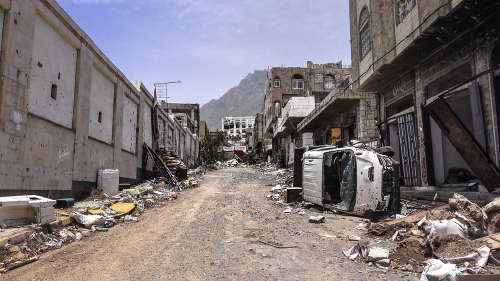|
|
The Biden administration last week was accused of essentially ensuring that the war in Yemen will continue after announcing a massive arms deal with Saudi Arabia and the UAE minutes after a ceasefire was announced.
The Biden administration on Tuesday approved the arms deal worth over $5 billion for Saudi Arabia and the UAE that will include Patriot missiles for the Saudis and $2.2 billion for high-altitude missiles for the UAE.
Raytheon produces these Patriot missiles, and it is worth mentioning that Lloyd Austin, the U.S. defense secretary, was on its board of directors before his job in the Biden administration.
The State Department praised the deal and said the sale will “support the foreign policy goals and national security objectives of the United States by improving the security of a partner country that is a force for political stability and economic progress in the Gulf region.”
The sale is meant to replenish Saudi Arabia’s dwindling supply of these missiles, the statement said.
“These missiles are used to defend the Kingdom of Saudi Arabia’s borders against persistent Houthi cross-border unmanned aerial systems and ballistic missile attacks on civilian sites and critical infrastructure in Saudi Arabia,” the statement read.
The Trends Journal has reported extensively on the conflict playing out in Yemen. (See “U.S. FIGHTING YEMEN WAR,” U.S. RAMPING UP MIDDLE EAST WARS” and “SAUDI-LED YEMEN SLAUGHTER ESCALATES.”)
Deliberate
Daniel Kovalik, a professor of International Human Rights at the University of Pittsburgh School of Law, told Al Mayadeen that the “Biden administration never had any intention to stop aiding the war efforts against Yemen.”
“This is so because, since the war’s inception in 2015, this has been a U.S. war as much as a Saudi-UAE war,” Kovalik said. “However, Biden knows that this was not popular with the Democratic base.”
Houthis have blamed the U.S. before for undermining truce agreements. Biden, who served as vice president under Barack Obama when the war started, has strongly supported the Saudi-led war that is now in its seventh year. Despite Biden vowing in February 2020 to end arms sales to the Saudis, he did a $650 million arms deal with the Saudi’s last November.
We reported on 26 April 2022 that the U.S.’s decision to sail eight warships into the Red Sea ostensibly to counter crimes being committed in the waterway. Houthi leadership complained at the time that the move ran counter to Washington’s claim that it supports the ceasefire and does nothing more than to enshrine the “aggression and blockade on Yemen.”
Dave DeCamp, the news editor of Antiwar.com, also told the outlet that the deal is proof that the Biden administration is not serious about ending the war.
“If he were, the U.S. could cut off all military support for the Saudi-led coalition, which would force Riyadh to come to the table of negotiations and make real concessions,” he said. “Instead, we see the new weapons sales and the Saudis not living up to their end of the truce by not fully lifting the blockade.”
All About That Oil
Shortly after the arms deal was announced, Saudi Arabia and the UAE promised to up their oil output if there is an energy supply issue this winter, Reuters reported, citing sources familiar with the issue.
“With possibly no gas in Europe this winter, with a potential price cap on Russian oil sales in the New Year, we can’t be throwing every barrel on the market at the moment,” a source told Reuters.
TRENDPOST: To call weapons of death “Patriot Missiles” is more than Orwellian, it is demonic. The murderous missiles have nothing to do with patriotism as does the Patriot Act which has robbed Americans of their human rights has nothing to do with patriotism… or the American Revolutionary War patriots who fought against the British tyranny.
Furthermore, the missiles are manufactured by Raytheon, the military industrial complex company that Lloyd Austin, America’s Defense Secretary, was a board member before being appointed to the seat by Joe Biden.
TRENDPOST: Yemen’s civil war started in 2014, when the Houthis, who were ruling large sections of Yemen for over 1,000 years, overthrew the unelected president put in control by the Saudis. The Houthis eventually took control of Sana’a, and then seized the presidential palace.
The Saudi-backed coalition is concerned that Houthi rule in Yemen would mean rival Iran would gain a foothold at the border with Saudi Arabia.
As we have reported, the U.A.E. pulled most of its troops out of Yemen in 2019 but the Saudis and other members of the coalition were unable to keep the Houthis at bay, especially in the oil-and gas-rich Marib province.
And while the ceasefire extension was seen as a positive development, the situation on the ground for millions of people is still dire. Yemen is widely viewed as the location of the world’s worst humanitarian crisis, and about 80 percent of its 30 million residents need some aid.
The Houthi-controlled government said about 30,000 people require medical treatment abroad, including 5,000 children.
Yet, this is rarely reported in the Western media where only dead Ukrainians count.

